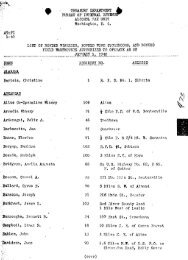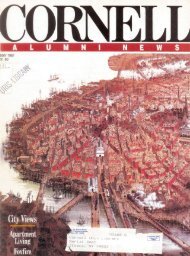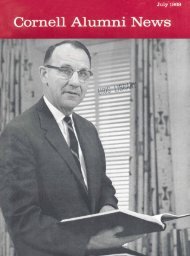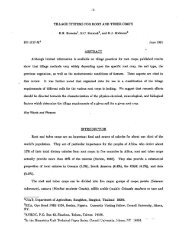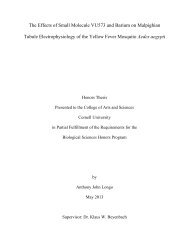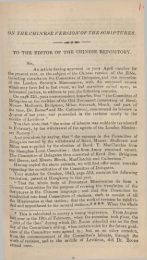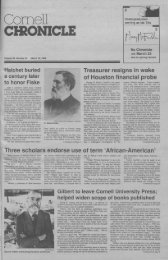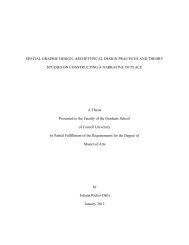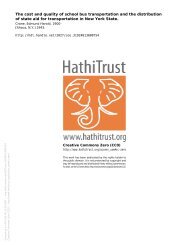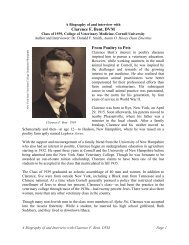Peru: you'll never see more species! - eCommons@Cornell - Cornell ...
Peru: you'll never see more species! - eCommons@Cornell - Cornell ...
Peru: you'll never see more species! - eCommons@Cornell - Cornell ...
Create successful ePaper yourself
Turn your PDF publications into a flip-book with our unique Google optimized e-Paper software.
about Central America, LaFeber is involved<br />
in "informing the debate," as he<br />
says, even though he admits he doesn't<br />
particularly like to go out and talk ("I<br />
do not like to fly in and out of Ithaca in<br />
the middle of the winter, for one thing,<br />
and I've got obligations here, which I<br />
take quite seriously"). That he nonetheless<br />
continues to make public appearances<br />
and statements addressing the situation<br />
in Central America is testament<br />
both to his concern for what is happening<br />
there and to what he feels is his "obligation<br />
as an educator."<br />
Much of Inevitable Revolutions concerns<br />
the historical illustration of one of<br />
the quotations with which LaFeber<br />
opens the book: the eye-opening 1980 remark<br />
by Ambler Ross, the US ambassador<br />
to Panama, that "[w]hat we <strong>see</strong> in<br />
Central America today would not be<br />
much different if Fidel Castro and the<br />
Soviet Union did not exist."<br />
Examining the history of American<br />
domination in the region, LaFeber<br />
shows how successive US administrations<br />
have misunderstood Central America's<br />
miseries. Although employed time<br />
and again, both economic aid and military<br />
intervention have done nothing but<br />
accelerate revolutionary conditions, he<br />
maintains, and will continue to do so so<br />
long as the US puts its own interests<br />
above an objective reading of the region<br />
and its history.<br />
LaFeber analyzes what he considers to<br />
be the two main approaches toward<br />
Central America competing for favor today<br />
in the United States. 'One is associated<br />
with the Reagan administration,"<br />
he says, "and that is that you use military<br />
pressure until governments change<br />
and become what you want them to become.<br />
"The other one [argues] that the Reagan<br />
approach has produced very bad results.<br />
It's driven some of those governments<br />
farther to the left, and accelerated<br />
the revolution. So a better way of doing<br />
it might be to bring in outside negotiators—a<br />
so-called contadora group [consisting<br />
of representatives from Venezuela,<br />
Colombia, Panama, and Mexico]—<br />
into the situation and allow them with<br />
the United States to try to mediate between<br />
the different factions, and ask for<br />
ceasefires, and try to work out political<br />
solutions.<br />
"Which would be very difficult," La-<br />
Feber hastens to add. "Extremely difficult.<br />
I don't think the Reagan administration<br />
can do it. Politically, they're<br />
about the least talented group we've had<br />
in power in a long time. And I just don't<br />
think they can probably negotiate something<br />
like that. But it <strong>see</strong>ms to me that's<br />
CORNELL ALUMNI NEWS<br />
He argues calmly,<br />
even in public,<br />
without crusading<br />
as do others<br />
in current debates<br />
much preferable to the military policy<br />
that they've been trying to follow, and<br />
that has not produced much."<br />
LaFeber states his arguments calmly;<br />
even when speaking in public, he lacks<br />
the strident, "crusading" tone that often<br />
<strong>see</strong>ms to characterize many who address<br />
Central American issues. He delivers<br />
the facts as he's discovered them with<br />
perspective, avoiding neither the gruesome<br />
reality of human rights violations<br />
nor the occasional opportunity to inject<br />
a touch of humor.<br />
For instance, in a Citizen's Forum on<br />
Central America held at Ithaca High<br />
School in late February, LaFeber discussed<br />
the different theories which the<br />
US has applied in Central American<br />
countries. In Honduras, we've employed<br />
the "Hallmark Theory, as in Hallmark<br />
cards," he explained. "That is, when<br />
you care enough to send the very best,<br />
send the United States Marines."<br />
As Virginia M. Harrington, Grad,<br />
notes, "He's not the crusader type. It's<br />
just not his style."<br />
"I care about this issue a great deal,<br />
because there are people dying down<br />
there," he says. "So if you know something<br />
about the area, and you think you<br />
can do something about it, you like to<br />
feel you're contributing something to<br />
helping resolve the situation.<br />
"When it comes right down to it, the<br />
reason I did the book, and the reason I<br />
accepted Mike Curtis's offer to do the<br />
thing for The Atlantic which set this all<br />
off, was that I had the feeling, and I still<br />
have the feeling, that we're talking<br />
about this very much in a vacuum. That<br />
we talk about policy in Central America<br />
as if it started in 1979, or in 1981. And<br />
you simply cannot understand what's<br />
going on down there until you go way,<br />
way back and <strong>see</strong> the roots of it."<br />
The Midwesterner<br />
There are some who might suggest that<br />
Walter LaFeber is a consummate midwesterner—confident<br />
yet low-key, solid<br />
but self-effacing. There is good reason<br />
for this "midwestern" turn of character:<br />
LaFeber was born and raised in Walkerton,<br />
Indiana, a quiet town of 2,500<br />
("eighteen miles from Notre Dame Stadium"<br />
is how he locates it).<br />
As he grew up, and even as he headed<br />
down to Hanover College in the southern<br />
part of the state, LaFeber <strong>never</strong> assumed<br />
his life would ultimately take him<br />
very far out of Walkerton. His father<br />
ran a local grocery store; young Walter<br />
figured he would eventually do the<br />
same. He did not come to realize his father<br />
had larger things in mind for him<br />
until one summer early in his undergraduate<br />
career.<br />
"One night, he and I were working<br />
very late," he remembers. "I said something<br />
about coming back to town and<br />
running the grocery store someday. And<br />
he said, 'No, you're not going to do<br />
that.' Which was news to me, because I<br />
just assumed he thought I was going to<br />
come back."<br />
Himself barred from college by a father<br />
who needed him in the store, the elder<br />
LaFeber refused to consign the same<br />
life to his own son.<br />
Suddenly stripped of his presupposed<br />
career, Walkerton's Walter LaFeber decided<br />
to pursue the study of history due<br />
nearly as much to a great teacher he had<br />
as to his own love of the subject. Right<br />
there "in this little Presbyterian school<br />
in southern Indiana," says LaFeber, "I<br />
had really the best teacher I've ever run<br />
across. He got a lot of us interested in<br />
history. Just in the four years I was<br />
there, he probably produced six PhDs in<br />
history."<br />
A year and a half after graduating<br />
from Hanover, LaFeber received, in<br />
1956, his master's degree in history from<br />
Stanford University. Proceeding to do<br />
his doctoral work at the University of<br />
Wisconsin, he studied there under Prof.<br />
Fred Harrington '33, who soon became<br />
Wisconsin's president.<br />
After a rough start in a doctoral program<br />
so rigorous and tedious that he and<br />
two close friends were on the verge of<br />
quitting, LaFeber and his classmates<br />
found their strength and faith renewed<br />
in'a late-night talk with Wisconsin's renowned<br />
"revisionist" historian, William<br />
Appleman Williams. (Disputing the<br />
work of many leading historians, especially<br />
concerning the nature of the Cold<br />
War, revisionists like Williams sought to<br />
remove what they saw as ideology from<br />
historiography, and to inject a true sense<br />
of history into contemporary writing<br />
and thinking.)<br />
On this particular night in Wisconsin,<br />
the three PhD candidates confronted



